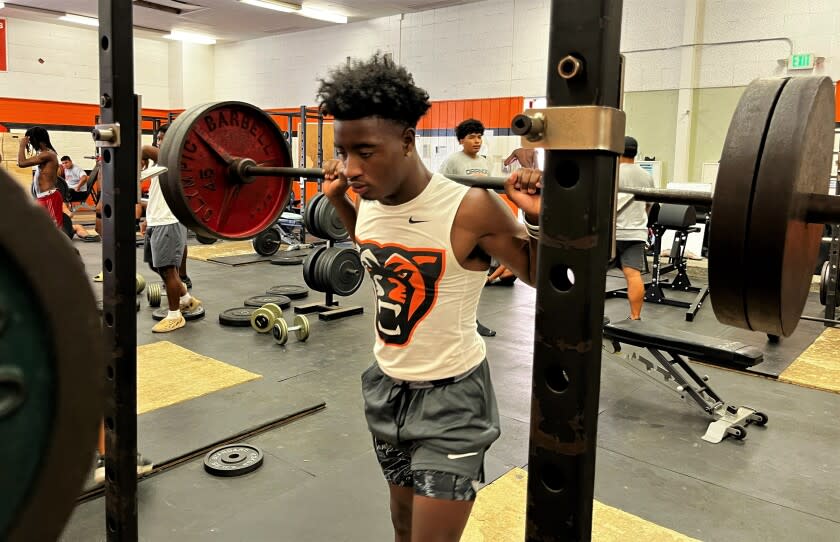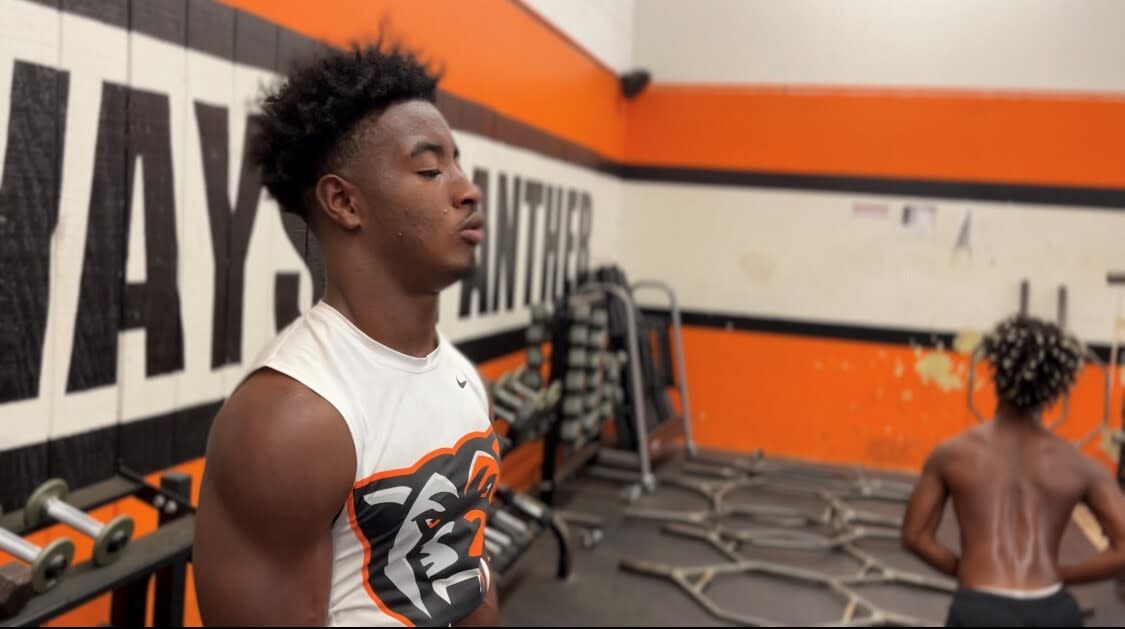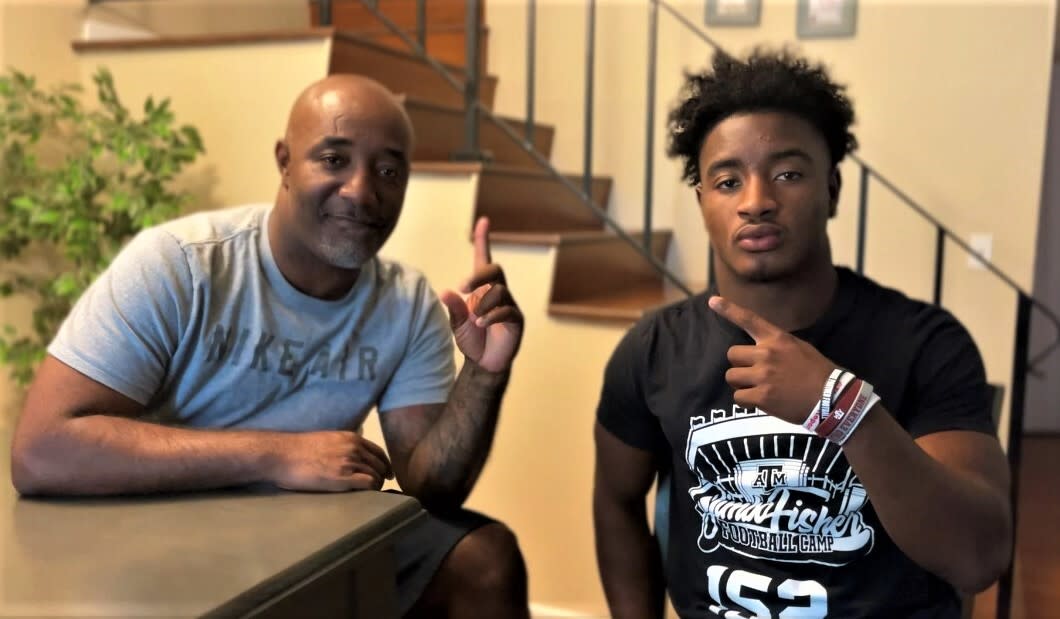Orange High football star Kobe Boykin wants to be the one in his family to make it

Kobe Boykin sits behind the end zone, hands clasped around his knees, trying to cool down as his teammates mill on the sideline of the football field.
“I’m wide open!” he mutters to his uncle Teejay White. “Like, throw me the ball!”
Kobe Boykin feels like an outcast. Didn’t matter that this was just a summer seven-on-seven scrimmage. Normally played like the queen on the chessboard of Orange High’s offense, the running back feels like a pawn.
Next series, the soon-to-be junior breaks a double move off the line of scrimmage and dusts a linebacker, hanging his head when he doesn’t get the ball thrown his direction. Double coverage comes, necessary to cover a kid with track-star speed. Throws sail past him, behind him. When the drive is over, he returns to the sideline, voicing his frustration.
“Every ball that’s been thrown to me is a decoy,” he exclaims in a coach’s direction. “I’m not crying for no f— reason.”
These aren’t the emotions of someone who’s had it all, anointed a star since youth football. These are the emotions of a kid who grew up on 6th Avenue in South Los Angeles, seeing loved ones head down paths he doesn't want to walk. A kid who's seen family members throw away their chance to play football. A kid who visits friends’ houses in the hills and thinks of how much he wants to be the one who made it out of the inner city through football.
“When things don’t go my way, I get frustrated a little bit, because I’m emotional,” Boykin says a few minutes after the scrimmage ends. His cadence quickens, voice rising with urgency. “I want them things. I want those catches. I want the ball.
“I don’t want to be an ‘I could have been,’” he continues. “I want to be that, ‘Yes, I am him.’”
“I get emotional sometimes because I just want the finer things in life.”
Kobe Boykin, Orange High running back
It happens almost every game. He scampers to the end zone, an unstoppable force meeting no immovable object, and the Orange student section is set ablaze with chants.
“Ko-be! Ko-be! Ko-be!”
Coach Robert Pedroza said he’s never had another player receive the same type of home-crowd adulation. Boykin stands all of 5 foot8 . But, as Pedroza said, “He’s the big man on campus.”
After COVID limited his freshman year at Orange to six games, Boykin broke out last season. He rushed for 1,150 yards, had 674 yards receiving and 25 touchdowns in 11 games. Boykin combines a low center of gravity with nimble footwork, becoming an all-purpose gamebreaker in the mold of his idol Tavon Austin.
“He feels comfortable in space,” Pedroza said. “It just puts defenses in a bind of how to cover him.”
Boykin gave an unofficial commitment to Utah as a sophomore — after playing football for only four years.
“In our world, he would be considered a late bloomer,” said trainer Dwayne Frampton Jr., who has worked with Boykin for a year. “For him to have all of this immediate success is wild. It’s beautiful.”

The informal commitment? Cool. The stats? Cool. Boykin wants more.
Sometimes he gets upset when he touches the ball and doesn’t score. Sometimes he claps his hands or shouts “come on!” in the middle of a route — when he demands the ball, he never drops a pass, Frampton said.
“I get emotional sometimes,” Boykin said, “because I just want the finer things in life.”
The chip on his shoulder never shrinks. So Kobe Boykin is often Kobe Boykin’s biggest advocate. And he won’t say sorry for that, because his grandpa taught him he shouldn’t be sorry for anything.
“I want to be great,” Boykin said. “I don’t feel like I’m too hard on myself, I just feel like I want more for myself. I want more for myself than other people.”
"When [Kobe] was born, I just said, he wasn’t going to go down that path."
Timothy Boykin, regarding how his and Kobe's brother's athletic careers were derailed in South L.A.
Two summers ago, Boykin said his brother, Tijae, was shot in the face by a rival gang member in South L.A.
Boykin said his brother survived, left with a scar under his eye. But when their father, Timothy Boykin, visited Tijae in the hospital, there wasn't much he felt he could do.
"The life he’s leading, did I expect it?" Timothy said. "Yeah.”
After playing football at Hawkins High, Tijae joined a gang, his father said. The eldest Boykin son, "Lil' Tim," starred at Venice High and drew college recruiters' attention. Lil' Tim was imprisoned after a robbery conviction, Timothy said, adding that they don't talk much anymore.
It was the same road Timothy said that he traveled as a kid, once a City standout whose promising football career evaporated after selling drugs and being incarcerated.
“When [Kobe] was born, I just said, he wasn’t going to go down that path,” said Timothy, now an employee at Los Angeles International Airport.

It was a “different type of feeling,” Kobe said, about receiving the call Tijae had been shot. Yet at the same time, it was a wake-up call.
“I couldn’t get steered the wrong way,” Kobe said. “I knew I was bigger than that.”
The goal was always to get him out of South L.A. So when Kobe entered high school, the family — Timothy, his wife, Glenda Rhea Boykin; and their 2-year-old daughter, Kayla — moved out of South L.A. so Kobe could attend Orange High.
They live in a tidy two-story house in West Covina, where the loudest noises are the rustle of tree leaves in the summer wind. Sometimes Timothy feels like an outsider in an Orange County area where 2% of residents are Black, but the house brings peace. His son feels comfortable. And that’s what he promised himself he’d give Kobe.
“When we come to school, we don’t see candles outside [for] people being killed,” Timothy said.
South L.A. will always be home to Kobe, though. He still visits there for training sessions with Frampton, who has worked with such receivers as the Rams’ Odell Beckham Jr.
One afternoon this spring, doing sprint drills up a hill in his hometown, an exhausted Boykin tapped out. He went back and forth with Frampton.
“You don’t want it anymore,” Frampton said he told Boykin.
Boykin got up. Shot his trainer a smile. And finished the final sprint.
“In that moment, I knew, OK, he’s the guy,” Frampton said. “He wants to be part of the 1% club.”
Boykin often holds up a single finger when he takes photos.
“We talk about it all the time: how he has to be the one,” Frampton said. “He has to be the one to make it the furthest.”
This story originally appeared in Los Angeles Times.
